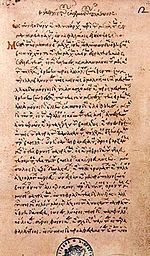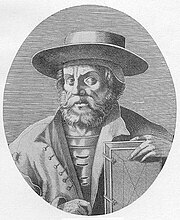




The migration waves of Byzantine Greek scholars and émigrés in the period following the end of the Byzantine Empire in 1453 are considered by many scholars key to the revival of Greek studies that led to the development of Renaissance humanism and science. These émigrés brought to Western Europe the relatively well-preserved remnants and accumulated knowledge of their own (Greek) civilization, which had mostly not survived the Early Middle Ages in the West. The Encyclopædia Britannica claims: "Many modern scholars also agree that the exodus of Greeks to Italy as a result of this event marked the end of the Middle Ages and the beginning of the Renaissance,"[5] although few scholars date the start of the Italian Renaissance this late.
- ^ Beckett, William à (1834). A universal biography: including scriptural, classical and mythological memoirs, together with accounts of many eminent living characters, Volume 1. Mayhew, Isaac and Co. p. 730. OCLC 15617538.
CHALCONDYLES (DEMETRIUS), a learned modern Greek, and a native of Athens, came over into Italy about 1447, and after a short abode at Rome
- ^ Bèze, Théodore de; Summers, Kirk M. (2001). A view from the Palatine: the Iuvenilia of Théodore de Bèze. Arizona Center for Medieval and Renaissance Studies. p. 442. ISBN 9780866982795.
Demetrius Chalcondyles (1423-1511), a Greek refugee who taught Greek at Perugia, Padua, Florence, and Milan. Around 1493 he produced a Greek textbook for beginners.
- ^ Rabil, Albert (1991). Knowledge, goodness, and power: the debate over nobility among quattrocento Italian humanists. Medieval & Renaissance Texts & Studies. p. 197. ISBN 978-0-86698-100-2.
John Argyropoulos (ca. 1415-87) played a prominent role in the revival of Greek philosophy in Italy. He came to Italy permanently in 1457 and held
- ^ Bunson, Matthew (2004). OSV's encyclopedia of Catholic history. Our Sunday Visitor Publishing. p. 141. ISBN 978-1-59276-026-8.
BESSARION, JOHN (c. 1395-1472) + Greek scholar, cardinal, and statesman. One of the foremost figures in the rise of the intellectual Renaissance in the
- ^ "Fall of Constantinople". Encyclopædia Britannica.